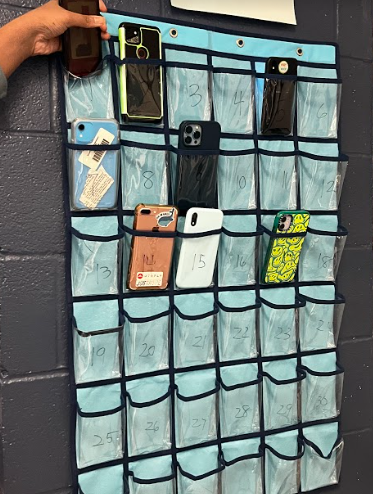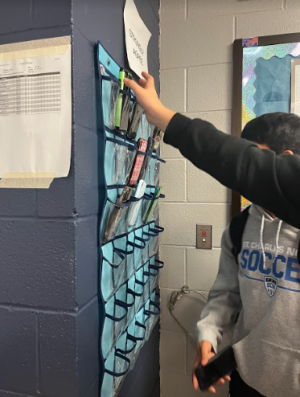Phone Caddies: Not Our Favorite, but Decrease Distractions

Students place their phone in the caddy as they come into class.
October 28, 2022
“Alright, phones in the caddy!”
Does this sound like a nightmare of a daily occurrence? For a lot of students at North, the phone caddies feel like the bane of our existence. The question is, are these phone caddies actually bad?
There are phone caddies in many classrooms throughout the building. They are made up of a grid of pockets, each to put a cell phone in. Some teachers choose to implement the use of these caddies, while others choose to allow students to keep their phones with them.
Personally, I feel that these phone caddies are helpful to students even though we tend to hate using them. I find that for myself, I get a lot more work done when my phone is away where I can’t use it, as it isn’t an immediate distraction. When your phone buzzes next to you, you immediately want to look at it, whereas if it’s across the room and you aren’t noticing it, it doesn’t pose as that distraction.
Furthermore, this disturbance has been tested through a series of experiments conducted by McCombs Assistant Professor Adrian Ward and co-authors. The study went through a series of three tests to examine how the proximity of the subject’s cell phone to them impacts their cognitive thinking skills. One test had the subjects’ phones in front of them, one had them close but out of sight (pocket, bag, etc.) and one with the phone in another room. All of the phones had sound alerts and vibrations disabled the entire time. The results were overwhelming, ultimately showing that the closer the phone was, the more it impaired the participants. According to the study, the effects of the phone being closer was comparable to that of lacking sleep. The participants with their phones close by didn’t have as great of a memory. They also made small mistakes and errors that other participants didn’t.
Phones catch our attention extremely easily. According to The University of Chicago Press Journals, the use of our phones is so habitual that it draws you in the same way hearing your name or a crying baby does.
Another common experience directly caused by the use of cell phones is the phenomena of “phantom vibrations.” They’re essentially when you think you hear or feel your cell phone vibrating when it isn’t. According to Dr. Larry Rosen, a research psychologist, any sound or feeling that is close to a phone vibration can catch our attention and cause us to believe our phone is going off, leading us to get distracted yet again. This continues to build upon the idea that our phones impair our ability to think clearly and uninterrupted.

Some might say that using the phone caddy should be a personal choice for the student because they may reason that not having your phone is a detriment to your freedom. While this is a valid argument, if your cell phone was truly needed, it’s not impossible to get to it. As for making it a choice, I know that I personally would not want to put my phone away for two main reasons. One, just because I know they’re helpful doesn’t mean I enjoy not having my phone, and two, many students wouldn’t choose to put theirs away, which can feel embarrassing if you did want to put yours away. The nice thing about the phone caddies is they allow you and students around you to focus on the classwork.
Students like to have their phones so they don’t feel like they’re missing out on anything in our fast-paced world. Nobody wants to feel like they’re missing out on anything, and our phones are our portal to almost everything going on around us. However, without any breaks, we barely get anything done and start to fall behind. The phone caddies help us to disconnect and be productive. In conclusion, no matter how much we as students tend to dislike anything that has to do with our phones leaving our sides, the use and implementation are incredibly helpful and beneficial to us as learners.




Keep Caddies optional • Oct 28, 2022 at 9:30 am
Personally, I find it distracting to NOT have my phone. One of my classes at North requires us to put our phones in caddies, and especially for the first few days, but to some degree even now, I found myself looking up constantly to make sure it was still there.(I am very paranoid with losing my phone)
In my classes at Compass Academy, use of caddies was briefly required this year, but this was soon changed to oeither being optional, or only required for students who had shown a need for it, depending on the class. We haven’t had any issues with students being unkind about it, and plenty of people willing use them. Of course, Compass, with it’s emphasis on independence and self management, might be a bit of a different animal to a more typical highschool such as North or East
Jadyn • Oct 28, 2022 at 9:19 pm
Awesome, of course, whatever works for you! My personal experiences are reflected here, but it sounds like you’ve got a system down. I would definitely say I see phones as a big distraction, but if that’s not the case for you in your setting then that’s great!